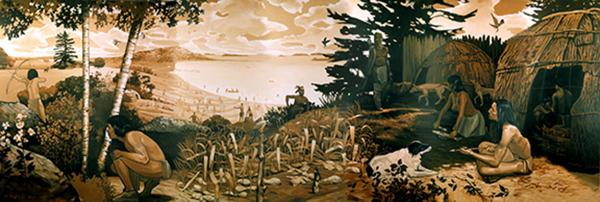July 27, 2022

A mural depicting Native American life in Dorchester before the arrival of Europeans in 1630 adorns the side of McKenna's Cafe in Savin Hill. The mural was created and installed by local artist James Hobin, who wrote about the project in the Reporter in 2014.
The Dorchester Historical Society and the Columbia-Savin Hill Civic Association (CSHCA) will team up next Sunday (July 31) in hosting Thomas Green, a Bay State native and descendant of the Native American Neponset band of the Massachusett tribe from which the state takes its name, as he discusses the history of the park and some of the customs of the Neponset people, and close out the event with a land blessing ceremony.
The event, at the top of Savin Hill near the Caspian Way entrance, will run from 1 p.m. to 2:30 p.m.
The Neponset people were led by the Sachem Chickataubut in 1620, when the English started coming by the thousands to settle in North America, according to the Massachusett Tribe website. By 1650, English settlers had outnumbered the Indigenous people and forced them over to the Blue Hills, into an area of Neponset Territory called Ponkapoag.
The historical portion of Green’s presentation will span from the 1600s to the early 1900s and focus on the interactions between Indigenous people and the English colonists, Indigenous leadership, and the events of the early colonial period.
Green’s main reason for sharing his knowledge with Dorchester residents is “to educate people,” he said in an interview, “to let people know a little bit about the actual truth about the Indigenous history of Massachusetts.”
Despite the plague brought by European traders that decimated Indigenous populations between 1616 and 1619, the elimination of culture and language, and other depredations committed against Native Americans, the Massachusett people are part of Massachusetts history and should be recognized as such, he asserted. “We were here and we are still here,” he said.
This is the first collaboration of its kind between the Dorchester Historical Society, CSHCA, and the Massachusett tribe.
“History isn’t one word but two words: His story,” Green said. “In common historical narratives, we rarely hear the side of the marginalized group. That is why it’s so important for people to learn about Native American history, especially the history and current presence of local Indigenous people.”
No matter what cultural or ethnic group is involved, Green believes the United States’ greatest problem is ignorance of one another’s history and experiences.
“We don’t know enough about each other to trust each other,” he said, “and I believe that should change.”
For more history of the Massachusett, visit massachusetttribe.org
Villages:
Topics:


